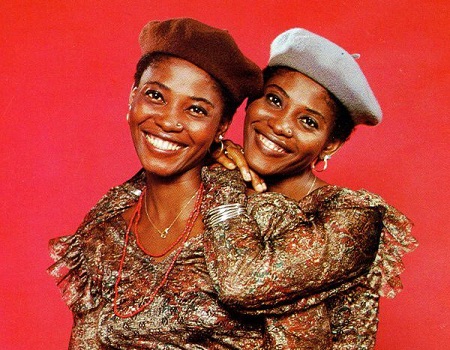They are enigmatic, difficult to classify. They evoke a nostalgia about a time and place; i.e. the post-independence, oil boom years. A time of innocence but also Danger, the title of one of their popular tracks. It is near-impossible to grasp their essence and understand their inspiration and influences, how they became the artistes they were and what led them to produce the kind of music they did. Their sound was almost completely different from anything on the scene then and ever since. It was from their own world. And what a world it was! In the very conservative 70s Nigeria, the duo gave interviews with cigarettes dangling between their painted lips. They came into the limelight in the 60s when women could only be backup singers. The titles of their songs were deeply artistic, evoking classic poems rather than pop songs.
The only clue to their genre-defying music is their mother’s influence. Did their music sound like a fusion of American jazz, soul, Yoruba waka, Cliff Richard and the Beatles from the British Isles, South African Makeba and Jamaican reggae? Did it sound very Yoruba and Nigerian (many of the hits were completely in Yoruba) and at the same time very Western? This is because their mother bought for them all the music hits of the 1960s, American, European and African. She also instructed them to produce music that will last forever, music that belongs to no place or era but also belongs all places and eras. All this is coming to light after one of the twins passed away on November 9, 2019. Lijadu Sisters and their music, for long somewhat popular but restricted largely to aficionados, are also starting to attract mainstream attention.
Career highlights
- They started singing at the young age of 10. Their mother bought them all sorts of records (by Elvis Presley, Frank Sinatra and so on).
- They released their first album Iya Mi Jowo with the British label, Decca Records in 1969. The record won them a small but dedicated following in England and America.
- In 1972, they performed with the English rock star Ginger Baker at the Olympic Games in Munich and stunned the crowd with their artistry.
- Their first album was followed by Danger (1976) Sunshine (1978) and Horizon Unlimited (1979). In a glowing 1988 review, the New York Times compared them to the California-based disco group, The Pointer Sisters.
- They had a very broad thematic range, ranging from the suggestive You Can Touch Me if You Want To to the philosophical and nostalgic Reincarnation. They also dabbled into politics with songs like Danger and Orere Elejigbo, a Yoruba track in which they lamented the recklessness of Nigerian ruling class. This is no surprise as they were cousins to the legendary Fela Anikulapo Kuti.
- In 2006, the sisters’ song “Life Gone Down Low” was sampled by American rapper Nas on his own song of the same name, without giving credit.
- They moved to New York in the 1980s, performing with artistes like King Sunny Ade. Aged 65, they also performed alongside Damon Albarn, Sinkane, Alexis Taylor of Hot Chip and Beastie Boys collaborator Money Mark at the Barbican, London in April 2014.
Some of their Classics
